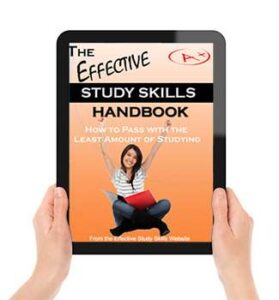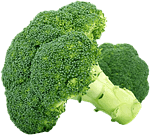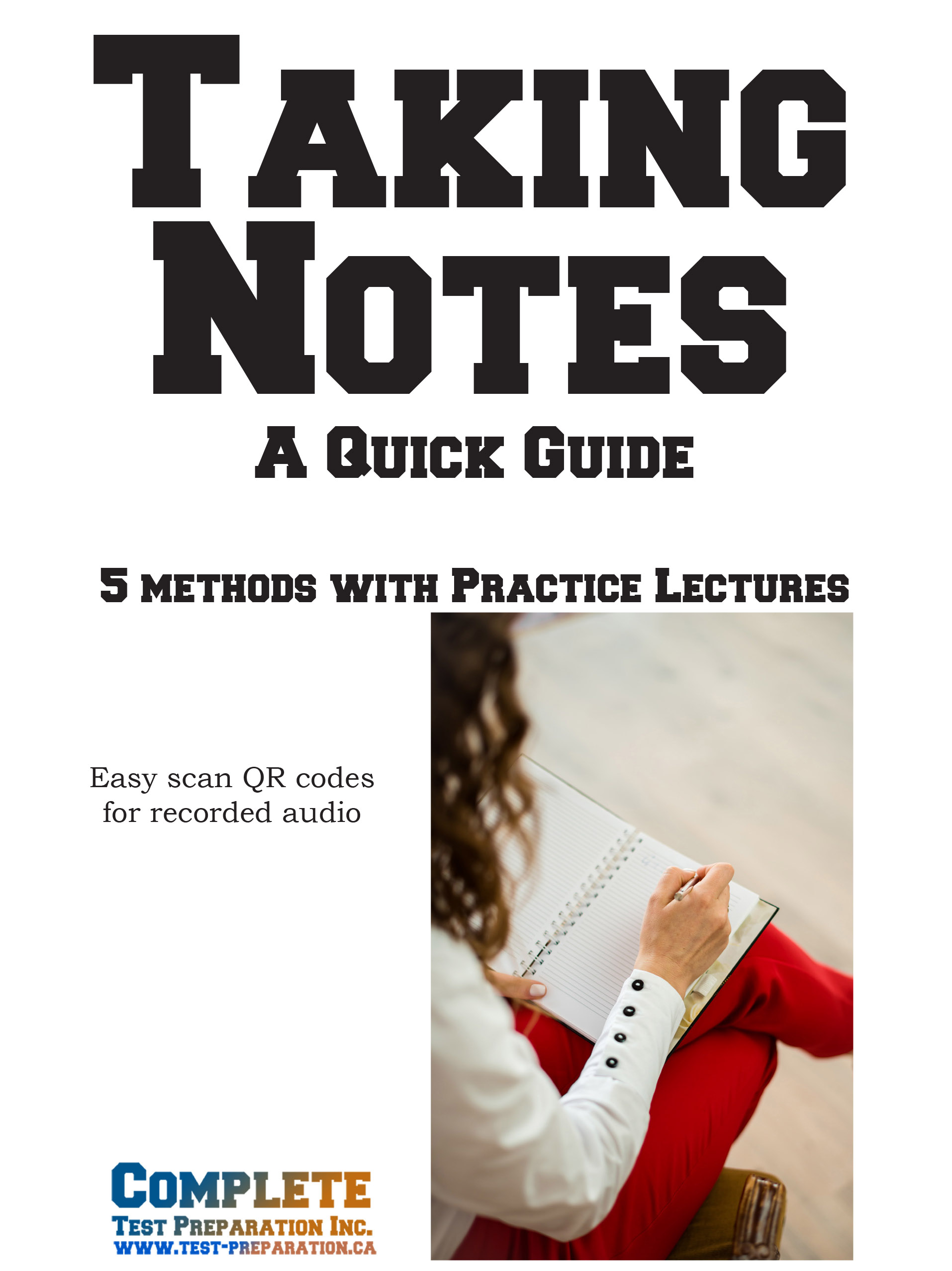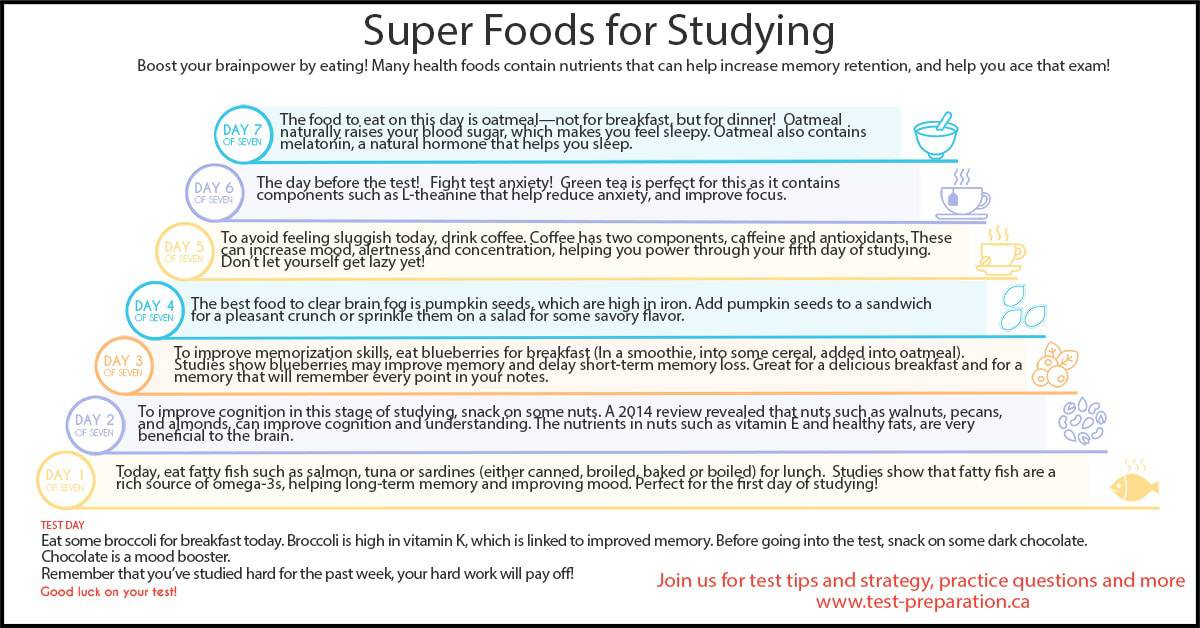Super foods for studying
- Posted by Brian Stocker
- Date December 26, 2019
- Comments 1 comment
Super Food and Studying

Or you look over and see someone eating walnuts while marking off their exam.
You wonder, “What could they possibly be doing?”
These students are boosting their brainpower by eating! Many health foods contain nutrients that can help increase memory retention, and help you ace that exam!
Although many classrooms and testing centers prohibit food, here are some tips to incorporate super nutrients into studying a week before exams and tests.
Day one of seven:

To retain the memory of all these flashcards you’ve made, eat some fatty fish such as salmon, tuna or sardines (either canned, broiled, baked or boiled) for lunch on this day. Studies show that fatty fish is a rich source of omega-3s, helping long-term memory and improving mood. Perfect for the first day of memorizing lots of terms. More on Flash cards
Day two of seven:

To improve cognition in this stage of studying, snack on some nuts during studying. A 2014 review revealed that nuts such as walnuts, pecans, and almonds, can improve cognition and understanding. Furthermore, a large study found that female who ate nuts regularly over several years were found to have sharper memory than those who did not eat nuts. The nutrients in nuts like vitamin E and healthy fats, may clarify why nuts are so beneficial to the brain.
Day three of seven:

How to Study Textbooks – A Quick Survey
To improve memorization skills for this day, eat blueberries for breakfast (In a smoothie, into some cereal, added into oatmeal, or even just eaten alone). A study done in animals showed that incorporating blueberries into their regular diet improved memory and delayed short-term memory loss. Great for a delicious breakfast and for a memory that will remember every point in your notes.
Day four of seven:

To teach clearly, one needs to clear their head of brain fog. The best food to do that are pumpkin seeds, which are high in iron. Those who have low iron levels often have brain fog and decreased brain function. Incorporate these pumpkin seeds to your diet by adding them to a sandwich for a pleasant crunch or sprinkling them onto a salad for some savory flavor.
Day five of seven:

To avoid feeling sluggish on this day, drink coffee. Coffee is composed of two main components, caffeine and antioxidants. These can increase mood, alertness and concentration, helping you power through your fifth day of studying. Don’t let yourself get lazy yet!
How to Study

… without endless hours of cramming
… without the need for tutoring
… and without sacrificing the things that matter to you!
Multiple Choice Secrets!

How to Take Notes
Learn 5 Note Taking Methods – With Full Explanation and Examples!
Taking notes is an essential academic skill and you will be doing a LOT!
Learn More and Start Practicing
Day six of seven:

In order to ace this mock exam, you need to be focused and anxiety-free. Green tea is perfect for this as it contains components such as L-theanine that help reduce anxiety. In addition, a study done with green tea has found that it helped improve performance and focus. Green tea would also help you become alert in the morning because of the small amount of caffeine it has.
Day seven of seven:
Use this day to relax and not worry about this test. This day is meant for reducing anxiety before test day in order to do your best on the test. If you feel the need to study, quickly skim over your organized notes and flashcards, otherwise, refrain from heavy studying like you’ve done for the past few days. Remember to get an adequate amount of sleep on the day before your exam. Sleep will help you wake up fresh and alert in the morning. More about test anxiety
The food to eat on this day is oatmeal—not for breakfast, but for dinner instead. Oatmeal naturally raises your blood sugar, which in turn, makes you feel sleepy. Oatmeal also contains melatonin, a natural hormone that helps you sleep. This food is perfect before test day to get good sleep and ace that test!
Test day:

Remember that you’ve studied hard for the past week, your hard work will pay off!
Additional Tips:
Keep distractions away from you while studying. Refrain from going to social media websites and lock away your cell phone in a cupboard or give it to a parent. If you are studying online, use Coldtrukey.com, a site that blocks certain sites for an allotted amount of time.
Another tip is to create a quiet place for your studying. Use your room, a basement or go to your public library to have a place that you can concentrate in. Creating a productive study space
Always divide studying into sessions. Create thirty-minute sessions, with fifteen-minute breaks in between. Creating studying sessions longer than this can make it harder to recall memories, as you are cramming in more information you can handle at a time.
Learn to relax before you take your exam. Do not drink coffee or tea before your exam to wake up, high amounts of caffeine before a test (not a studying session) can increase heart rate, heightening anxiety during the test. When answering test questions, do not linger too much on a question you cannot answer, and come back to it on at the end of the test. Sometimes, you my find the answer in another test question, or looking at it with fresh eyes may help you recall some memory from studying to help you answer the question correctly.
Good luck on your test!
Date Published: Thursday, December 26th, 2019
Created by Brian Stocker and the team in Victoria, BC.
Helping students succeed since 2005
Got a Question? Email me anytime - Brian@test-preparation.ca
You may also like
Memory Palace Technique with Examples
The Memory Palace Technique creates stories with familiar places and objects which are associated with certain information. Let me explain the process, let’s us an example to help simplify. We are going to memorize the number five hundred twenty two. …
How not to Get Distracted while Studying
Just eliminate all distractions! Well, unfortunately it’s not that easy for me. I will fiddle with my pen, doodle in the textbook, get lost in thought looking out the window, or make up a song while tapping on my desk. …
Mindfulness – Top Study Method
Doing well on exams may not be enough anymore. You need to graduate with marks that wow, dazzle and sparkle. Standardized testing is currently how comparisons are made among schools and between students. As a student you are in control …



1 Comment
thanks! watch coffee and light breakfast before a test